Related Research Articles

Aleksandar Živojinović,, known professionally as Alex Lifeson, is a Canadian musician, best known as the guitarist and backing vocalist of the progressive rock band Rush. In 1968, Lifeson co-founded the band that would later become Rush, with drummer John Rutsey and bassist and lead vocalist Jeff Jones. Jones was replaced by Geddy Lee a month later, and Rutsey was replaced by Neil Peart in 1974. Before the band was disbanded in 2018, Lifeson was the only continuous member who stayed in Rush since its inception, along with bass guitarist/vocalist Geddy Lee, the only member to appear on every album.

Geddy Lee is a Canadian musician, singer, and songwriter. He is best known as the lead vocalist, bassist, and keyboardist for the Canadian rock group Rush. Lee joined the band in September 1968, at the request of his childhood friend Alex Lifeson, replacing original bassist and frontman Jeff Jones. Lee's solo effort, My Favourite Headache, was released in 2000.

Neil Ellwood Peart OC was a Canadian musician, songwriter, and author, best known as the drummer and primary lyricist of the rock band Rush. Peart earned numerous awards for his musical performances, including an induction into the Modern Drummer Readers Poll Hall of Fame in 1983, making him the youngest person ever so honoured. Known to fans by the nickname 'The Professor', his drumming was renowned for its technical proficiency and his live performances for their exacting nature and stamina.

Rush was a Canadian rock band formed in Toronto in 1968 by guitarist Alex Lifeson, drummer John Rutsey and bass guitarist/vocalist Jeff Jones, who was immediately replaced by bassist/vocalist Geddy Lee. After Lee joined, the band went through several configurations before arriving at its classic power trio lineup with the addition of drummer/lyricist Neil Peart in July 1974, who replaced Rutsey four months after the release of their self-titled debut album. This lineup remained intact for the remainder of the band's career.

Fly by Night is the second studio album by the Canadian rock band, Rush, released on Feb. 15, 1975 on Mercury Records. It was the first Rush album to showcase elements of progressive rock for which the band has become known. It was also the first to feature lyricist and drummer Neil Peart, who replaced original drummer John Rutsey the previous summer just prior to the band's first North American tour. Peart took over as Rush's primary lyricist, and the abundance of fantastical and philosophical themes in his compositions contrasted greatly with the simpler hard rock of the band's debut album.
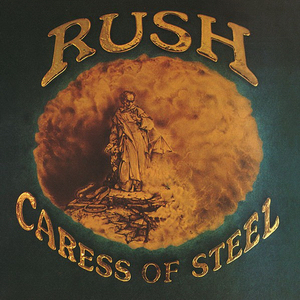
Caress of Steel is the third studio album by Canadian rock band Rush, released on September 24, 1975 by Mercury Records. It marked a development in the group's sound, moving from the blues-based hard rock style of their debut towards progressive rock. The shift proved to be a commercial and critical nadir for Rush, however, as the album's darker sound and fantastical compositions initially failed to find an audience and confused some of the band's peers, while poor sales put the band in danger of being dropped by Mercury. Despite being more positively viewed by the band's fans in retrospect, Ultimate Classic Rock noted that the album is still considered "the black sheep of their catalog".
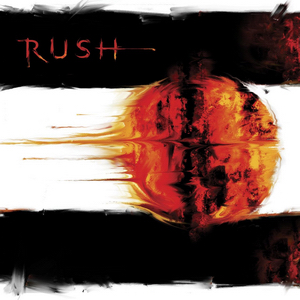
Vapor Trails is the seventeenth studio album by Canadian rock band Rush. It was released on May 14, 2002, on Anthem Records, and was their first studio release since Test for Echo (1996), the longest gap between two Rush albums. After the Test For Echo tour finished in July 1997, drummer and lyricist Neil Peart suffered the loss of his daughter and then his wife in separate tragedies. As a result, the group entered an extended hiatus during which it was not certain they would continue. They eventually reunited in January 2001 to rehearse material for a new album, recording for which lasted until November. For the first and only time since Caress of Steel (1975), the group did not use any keyboards or synthesizers in their music, incorporating many layers of guitar, bass and drums instead.

Rush in Rio is a three-disc live album by Canadian band Rush, released on October 21, 2003. The album is also available as a two DVD set. With the exception of the last two tracks on the third disc, the album was recorded at Maracanã Stadium in Rio de Janeiro on the final night of the Vapor Trails Tour. The other two tracks were taken from previous shows on the same tour. "Between Sun & Moon" was recorded at the Cricket Wireless Pavilion, Phoenix, Arizona, on September 27, 2002, and "Vital Signs" was recorded at the Colisée Pepsi, Quebec City, Quebec, on October 19, 2002.

Different Stages is a live album by Canadian rock band Rush, released in 1998. The bulk of the first and second discs were recorded at the World Music Theatre in Tinley Park, Illinois during the 1997 Test for Echo tour. Five other songs from various stops along the tour were included and three songs from the 1994 Counterparts tour. The third disc is taken from a performance at the Hammersmith Odeon in London during the A Farewell to Kings tour in 1978.
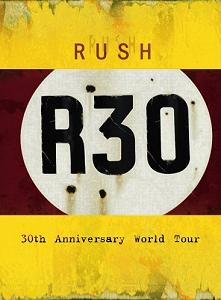
R30: 30th Anniversary World Tour is a live DVD by the Canadian rock band Rush, released on November 22, 2005 in Canada and the US, and November 28, 2005 in Europe. The DVD documents the band's R30: 30th Anniversary Tour, and was recorded on September 24, 2004 at the Festhalle Frankfurt, Germany.
"Xanadu" is a song by the Canadian progressive rock band Rush from their 1977 album A Farewell to Kings. It is approximately eleven minutes long, beginning with a five-minute-long instrumental section before transitioning to a narrative written by Neil Peart, which in turn was inspired by the Samuel Taylor Coleridge poem Kubla Khan.
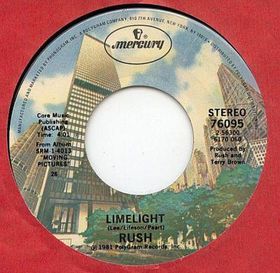
"Limelight" is a song by the Canadian progressive rock band Rush. It first appeared on the 1981 album Moving Pictures. The song's lyrics were written by Neil Peart with music written by Geddy Lee and Alex Lifeson. "Limelight" expresses Peart's discomfort with Rush's success and the resulting attention from the public. The song paraphrases the opening lines of the "All the world's a stage" speech from William Shakespeare's play As You Like It; the band had previously used the phrase for its 1976 live album. The lyrics also refer to "the camera eye", the title of the song that follows on the Moving Pictures album.
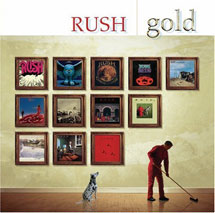
Gold is a compilation album by Canadian rock band Rush, released on April 25, 2006.

"Lakeside Park" is a single from Rush's third album Caress of Steel. The music was written by Geddy Lee and Alex Lifeson, and the lyrics were written by Neil Peart.
"Freewill" is the second track on the 1980 album Permanent Waves by Canadian progressive rock band Rush. The song's music was composed by Geddy Lee and Alex Lifeson, and its lyrics written by Neil Peart. In a 2016 review of Rush discography for Ultimate Classic Rock, Eduardo Rivadavia described "Freewill" as a "cerebral but remarkably radio-friendly" song. Lee has stated that the final verse of "Freewill" is at the highest part of his vocal range.

Rush Through Time is a compilation album by Rush, released in Europe as a picture disc only in 1979. The compilation contained selections from the band's second, third, fourth, and fifth studio albums. The album was subsequently repackaged as a standard vinyl album with a colour sleeve and updated graphics on the back cover in 1982.

"Headlong Flight" is the second single from Canadian rock band Rush's 19th studio album, Clockwork Angels. It was released to radio stations and for online preview on April 19, 2012, and became available digitally and on disk April 24, 2012. A lyrics video was also made available on YouTube. In an interview with Rolling Stone, Geddy Lee commented on the song:
'Headlong Flight' was one of those songs that was a joy to write and record from beginning to end. Alex [Lifeson] and I had blast jamming in my home studio one day before the second leg of the Time Machine tour, and I did not revisit that jam until a year later. Alex and I assembled the song to be an instrumental and its original title was 'Take That Lampshade Off Yo Head!,' but once we saw the lyrics Neil [Peart] had written, I knew that the spirit of the lyrics matched the instrumental perfectly and it was just a matter of making them fit and writing the melodies.
The Moving Pictures Tour was a concert tour by Canadian rock band Rush in support of their eighth studio album, Moving Pictures.
References
- 1 2 Bowman, Durrell (2014). Experiencing Rush: A Listener's Companion. Rowman & Littlefield. p. 13. ISBN 9781442231313.
- ↑ Popoff, Martin (2013). Rush: The Illustrated History. Voyageur Press. p. 26. ISBN 9780760343647.
- ↑ Wagner, Jeff (2010). Mean Deviation: Four Decades of Progressive Heavy Metal. Bazillion Points Books. p. 23. ISBN 9780979616334.
- ↑ Begrand, Adrien (10 June 2014). "Caress Of Steel (1975)". Stereogum . Retrieved 30 July 2017.
- ↑ Holm-Hudson, Kevin (2013). Progressive Rock Reconsidered. Routledge. p. 190. ISBN 9781135710224. First published in 2002.
- ↑ Harris, Craig. "Dream Theater | Biography & History". AllMusic . Retrieved 4 April 2019.
The Grammy-nominated Long Island-based quintet Dream Theater are, in the 21st century, the standard bearers of progressive metal. While the subgenre's origins can be traced to Rush's song 'Bastille Day' in 1975...
- ↑ "Caress of Steel: Released September 1975". 2112.net. Retrieved 12 July 2012.
- ↑ "Dream Theater: 20 Majestic Years". therecordmag.com. Archived from the original on 7 January 2009. Retrieved 12 July 2012.